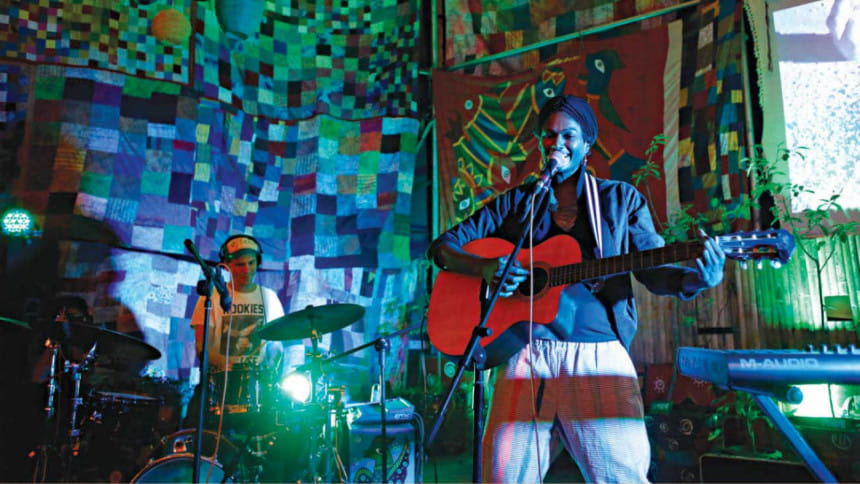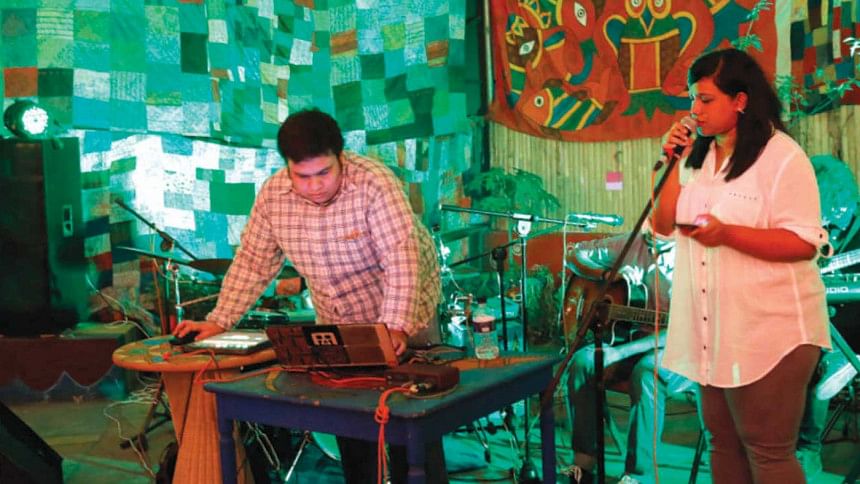JATRATRONICA

Jatratronica, organised by Goethe-Institut and Jatra Biroti (in Banani, Dhaka) on February 19, aimed to bring into focus the budding electronic music scenes of South Asia and Germany. Although Bangladeshi music enthusiasts aren't strangers to electronica, it is far from becoming an integral part of our everyday playlist. Jatratronica was a brave attempt meant to inspire local electronic music artists and make the genre more accessible in the process. The event, which was open to all, was a welcome change from the impossibly hectic city life that we're all accustomed to.
Although entry was restricted to the first 200 people, an immense turnout graced the event even before it started. By 6 pm, the rooftop of Jatra Biroti was packed with music enthusiasts eager to see what the evening had in store for them. Limited accommodation and a drawn-out, tedious entry procedure requiring email id verification – which could have been easily avoided with an entry-pass system – threatened to delay the event by almost an hour. However, a central refreshment booth serving tea and delicacies, such as fuchka and pitha (to die for and free!), made for a mellow wait as the organisers efficiently dealt with the crowd of expectant viewers.

Upon entering the rooftop, my attention was immediately drawn to the beautiful decorations, which seemed to bloom in a thousand hues. Come dusk, the hanging blue lights gave way to a softer ambience. Not only was it aesthetically pleasing, the kaleidoscope of colours seemed designed to entrance the audience, as if suspended in a dream. A large screen to the right displayed startling yet intriguing visuals throughout the evening.
The concert started off with the first act, Chicken Soup, comprised of members Shoummo Saha and Humayun Islam. They performed their own rendition of the song “Rabbit in Your Headlights” – an innovative arrangement with futuristic sound loops and soft, digital melodies. Then, they moved on to original songs composed especially for the event. Chicken Soup's music felt like a collision between space-age and retro sounds, interspersed with groovy beats. As the evening progressed, their music became quite catchy, and got the crowd swaying to the rhythm.
After a small transition segment, Ebb, comprising of members Rittika Ali, Atik Sameer, Saybe Dipro, Mostafa Shartaj and Fahad Zaman, hit the stage with their indie-tronic sound and soulful vocals. They performed a number of acoustic covers, backed by low-bass and electronic beats. Although initially their confidence seemed to wane, Ebb grew bolder as the evening rolled on and the crowd drew into their unique sounds and soothing tunes. While their rendition of James Blake's “Retrograde” sounded like a fusion between slow jazz and the blues, it was their cover of Nirvana's “Come as You Are,” blending the original with electronic influence, that engaged the audience. Although somehow melancholic, Ebb's music is a welcome retreat from our hyper-stimulated times. In comparison, Speakeasy's performance was reminiscent of impromptu jamming sessions one might have with friends. They won hearts with their brave fusion of blues with experimental trance.
However, the best was saved for last: the final act of the evening, Perera Elsewhere. A Berlin-based singer-songwriter, Perera uses a combination of acoustics, trumpets, percussion, vocals and electronics to create her own surreal blend of Nu Jazz (A modern down-tempo sub-genre). Although I had never heard her music before, there was something so mesmerising about it that I've been frequenting her Soundcloud page ever since. Her song “Bizarre” could best be called haunting – it left me in simultaneous states of unease and an indescribable calm. On the contrary, Perera's “Drunk Man” was an odd, wacky number with unconventional twists and turns, an apparent embodiment of the artist's own idiosyncrasies.
Although not the first of its kind by any means, Jatratronica represents the efforts of a criminally underrated class of art in Bangladesh. The sheer novelty of that evening makes me think about how so much innovation goes unnoticed, or worse, uncredited, as we while away our time in the triteness of our metropolitan lives. Innumerous possibilities surface with the growth of electronic music. For instance, the unique integration of visual stimulation alongside melodic composition in this genre employs more than just our auditory sensations. Perhaps in the future, music will evolve to incorporate three, or maybe even all five of the human senses. The notion is as frightening as it is exciting – 50 years from now, what will music grow to become?
I can't know for sure. But I do know this: as long as events like Jatratronica continue to pioneer the efforts of innovative musicians across the world, music will keep transforming – ethereal and beautiful as always.

 For all latest news, follow The Daily Star's Google News channel.
For all latest news, follow The Daily Star's Google News channel. 





Comments